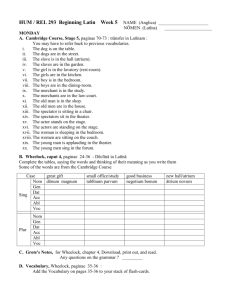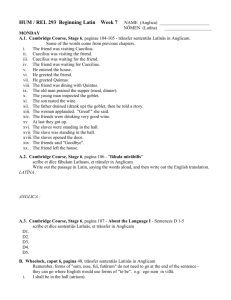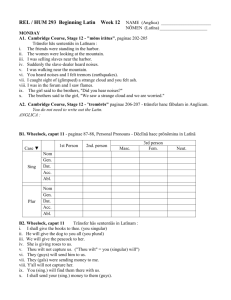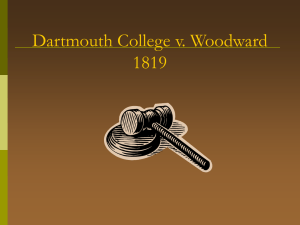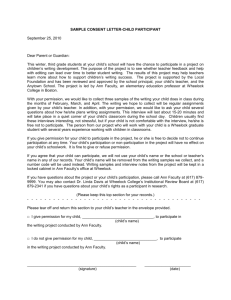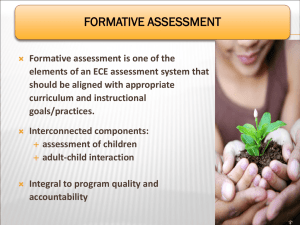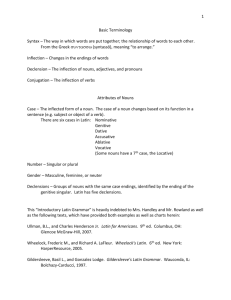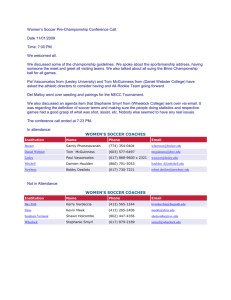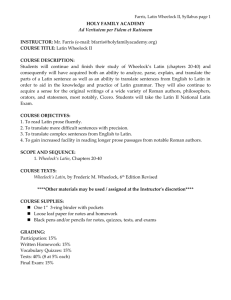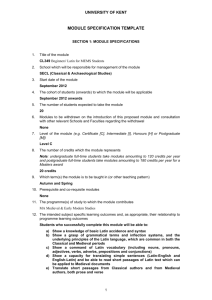REL / HUM 293 Beginning Latin Week 3 NAME (Anglica)
advertisement
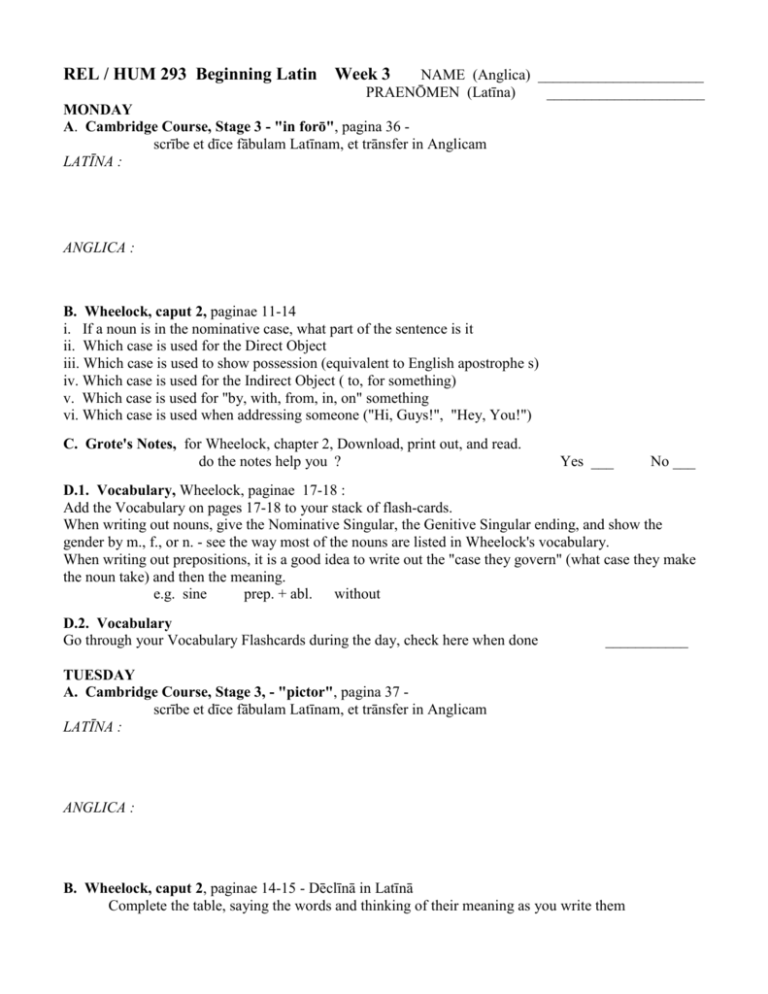
REL / HUM 293 Beginning Latin Week 3 NAME (Anglica) ______________________ PRAENŌMEN (Latīna) _____________________ MONDAY A. Cambridge Course, Stage 3 - "in forō", pagina 36 scrībe et dīce fābulam Latīnam, et trānsfer in Anglicam LATĪNA : ANGLICA : B. Wheelock, caput 2, paginae 11-14 i. If a noun is in the nominative case, what part of the sentence is it ii. Which case is used for the Direct Object iii. Which case is used to show possession (equivalent to English apostrophe s) iv. Which case is used for the Indirect Object ( to, for something) v. Which case is used for "by, with, from, in, on" something vi. Which case is used when addressing someone ("Hi, Guys!", "Hey, You!") C. Grote's Notes, for Wheelock, chapter 2, Download, print out, and read. do the notes help you ? Yes ___ No ___ D.1. Vocabulary, Wheelock, paginae 17-18 : Add the Vocabulary on pages 17-18 to your stack of flash-cards. When writing out nouns, give the Nominative Singular, the Genitive Singular ending, and show the gender by m., f., or n. - see the way most of the nouns are listed in Wheelock's vocabulary. When writing out prepositions, it is a good idea to write out the "case they govern" (what case they make the noun take) and then the meaning. e.g. sine prep. + abl. without D.2. Vocabulary Go through your Vocabulary Flashcards during the day, check here when done ___________ TUESDAY A. Cambridge Course, Stage 3, - "pictor", pagina 37 scrībe et dīce fābulam Latīnam, et trānsfer in Anglicam LATĪNA : ANGLICA : B. Wheelock, caput 2, paginae 14-15 - Dēclīnā in Latīnā Complete the table, saying the words and thinking of their meaning as you write them Case Singular Nom. Gen. Dat. Acc. Abl, Voc Plural Nom. Gen. Dat. Acc. Abl, Voc big door porta magna ancilla pulchra culina taberna toga C. Prof. Mark Damen's Notes for Wheelock, chapter 2 - Download, print out, and read. do the notes help you ? Yes ___ D. Vocabulary : Go through your Vocabulary Flashcards during the day, check here when done _______ WEDNESDAY A. Cambridge Course, Stage 3 - "tōnsor" , paginae 38-39 scrībe et dīce fābulam Latīnam, et trānsfer in Anglicam LATĪNA : ANGLICA : B. Wheelock, caput 2, pagina 16 - Dēclīnā in Latīnā Complete the table, saying the words and thinking of their meaning as you write them Case Singular Nom. Gen. Dat. Acc. Abl, Voc Plural Nom. Gen. Dat. Acc. Abl, Voc poēta agricola nauta inhabitant incola No ___ pīrāta C. From the Resource Links for Wheelock, chapter 2, try some of Prof. Marchesi's drills (include the Vocabulary drill) Which drill did you like most ? __________ D. Vocabulary : Go through your Vocabulary Flashcards during the day, check here when done _______ THURSDAY A. Cambridge Course, Stage 3 - "vēnālīcius", pagina 40 scrībe et dīce fābulam Latīnam, et trānsfer in Anglicam LATĪNA : ANGLICA : B. Wheelock, caput 2 - Sententiae Antīquae, pagina 19 scrībe et dīce sententiās Latīnās, et trānsfer in Anglicam Write out, saying the words aloud, and translate the sentences on page 19 You do not need to write out the English of sentences 16-20, just your Latin translation. 1. 2. 3. 4. 5. 6. 7. 8. 9. 10. 11. 12. 13. 14. 15. 16. The girls save the poet's life. 17. Without philosophy we often go astray and pay the penalty. 18. If your land is strong, nothing terrifies the sailors and you ought to praise your great fortune. 19. We often see the penalty of anger. 20. The ancient gate is large. C. From the Resource Links for Wheelock, chapter 2, try some of the U. of N. Carolina drills Which drill did you like most ? __________ D. Vocabulary : Go through your Vocabulary Flashcards during the day, check here when done _______ FRIDAY A.1. Cambridge Course, Stage 3 - "About the Language" , pagina 41 - and the list of names in the course notes, translate trānsfer in Latinam : i. Paul praises Mary. ii. Mary warns Martha. iii. Martha sees Peter. iv. Peter calls Anthony. v. Antonio and Sergio blame Julie. vi. Julie and Eve love Claud. vii. Claud and Emil avoid Olivia. viii. Olivia and Rose kiss Timothy. A.2. Cambridge Course, Stage 3 - "Practicing the Language", pagina 42, scrībe exercitātiōnēs A et C - Write out exercises A & C A.1 A.2 A.3 A.4 A.5 C.1 C.2 C.3 C.4 C.5 C.6 C.7 C.8 A3. Cambridge Course, Stage 3. This week's Question Words are quis - who? quem - whom? quālis / quālem - what sort of? quid - what ? ubi - where? Answer the following questions in Latin, then translate them into English. Write complete sentences for your answers. Remember that adjectives have to agree with the nouns they describe. Responde in Latinā. Respondē in tōtā sententiā ("Answer in complete sentences") i. ubi est Syphāx? ii. quālis mercātor est Syphāx? iii. quālem ancillam Syphāx vēndit? iv. ubi Celer pingit? v. quid Celer pingit? vi. quālem leōnem Celer pingit? v. quem Metella laudat? vi. quis Metellam salutat? v. quālis puella est Melissa? vi. quālem versum poēta in tabernā recitat? B.1. Wheelock, caput 2 - "Catullus bids his girlfriend Farewell", pagina 20 scrībe et dīce in Latīnā, et trānsfer in Anglicam LATĪNA : ANGLICA : B.2. Wheelock, caput 2 - Etymology, paginae 21 - 22 : Write the meaning of the English word, the Latin word, and the meaning of the Latin word. i. volatile ii. venial iii. turbulent iv. insane v. tenet vi. creature vii. nullify viii. concatenation ix. onerous x. rotary xi. obdurate B.3. Wheelock, caput 2 - "Latīna est gaudium", pagina 22 : Responde in Latinā. Respondē in tōtā sententiā (Complete the following conversation in Latin : Answer in complete sentences. You may choose a Latin name for yourself, or turn your own name into a Latin form) 1. Salvē, discipule/a ! 2. Quid est nōmen tibi? 3. Quid agis hodiē? 4. Valē ! C. From the Resource Links for Wheelock, chapter 2, try some of the U. of Victoria drills Whose drills from this week do you like the most ? __________ D. Vocabulary : Go through your Vocabulary Flashcards during the day, check here when done _______ E. Review and Consolidation : Check below when completed Put a check in the columns at the right when you have completed each task : Do each task 5 times Downloads for Grammar drills are available from the Assignment Page. 1. Choose one -āre verb and write out the Present Active Indicative 2. Choose one -ēre verb and write out the Present Active Indicative 3. Choose one First Declension noun and write out its Declension __ __ __ __ __ __ __ __ __ __ __ __ __ __ __
